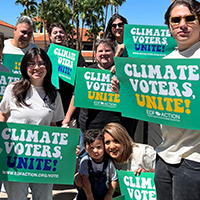China is going all in on clean energy while Trump waffles. How is that making America great again?

By Tom MurrayVice President, Corporate Partnerships Program, EDF
For months, the clean energy discussion in the United States has been dominated by two questions: First, will the new administration really turn its back on the climate and clean energy policies that have helped create a burgeoning American industry? And if it does, how serious a blow will that be for the sector – and the global transition to clean energy?
China just answered the second question.
This week, we learned that China’s National Energy Administration had announced that in the next three years alone, the country will invest $361 billion in renewable power generation. The spending comes as the cost of building large-scale solar plants has dropped by as much as 40 percent since 2010.
While the Trump administration talks about renewing an outdated love affair with coal and oil, China’s investment is poised to generate more than 13 million jobs in the clean energy sector.
In other words, the global energy transition is going to be fine. Whether the United States will be fine remains to be seen.
Because if President-elect Trump follows through on his campaign promise to withdrawfrom the Paris climate agreement, he won’t just be turning a blind eye to the science of climate change, he’ll be hurting American businesses.
Industries, thousands of jobs at stake
China, India, the European Union, Canada and others have strong incentives to embrace cleaner technologies, with or without the U.S. Yes there’s the health of the planet, but there’s also economic self-interest to take into account.
Driven by lower prices and greater demand for wind and solar, clean energy industries currently employ 2.5 million Americans. Since 2014, solar installation has created more jobs than oil and gas pipeline construction and crude petroleum and natural gas extraction combined.
There are more American jobs in solar energy today, 209,000, than in coal mining which employs 53,000. Solar is adding workers nearly 12 times faster than the overall economy – accounting for one out of every 83 jobs created in the U.S. Wages paid to solar workers, meanwhile, remain competitive with similar industries and are above the national median wage of $17.04 per hour.
There are an additional 77,000 workers employed at wind firms across the nation. Clean energy policies and emissions safeguards are driving the market and development of technology here, giving us valuable products and services to export.
As demand for renewables rises, particularly in the corporate sector where sustainability commitments continue to be aggressive, new jobs will follow.
If the Trump administration saps the current momentum toward a clean energy future by backing away from the Paris Climate Agreement, the U.S. stands to innovate less, export less, and ignore a bourgeoning job market. This prospect is very real, as every day brings additional news of climate skeptics creating a dangerous imbalance in the Trump administration.
<p”>And while we ricochet from the changes here at home, the global momentum on climate moves on.
A global race to the top – without us
China’s huge new investment in to clean energy is further proof that it has no plans to change course on climate. In fact the Chinese leadership is emboldened by the news coming out of America.
A senior Chinese climate change official, Zou Ji, underscored that if Trump abdicates U.S. leadership on the Paris Agreement, “China’s influence and voice are likely to increase […] which will then spill over into other areas of global governance and increase China’s global standing, power and leadership.”
The European Union also plans to stay the course, vowing to stick to its environmental policies and climate targets regardless of what the U.S. does. Peter Zapfel, head of the European Commission’s emissions trading unit in Brussels said, “We have predictability in Europe. We have already agreed our 2030 targets.”
A free ride for America? Hardly.
The idea of the world’s second-biggest polluter taking a free ride while others in the global community pull their weight is not only absurd but will have serious economic consequences.
<p”>The new administration’s actions could lead China and the EU to respond with climate-focused trade measures, such as imposing a carbon price on imports of high-carbon products, as in a carbon tariff border adjustment, from the U.S. and others. Former French President, Nicolas Sarkozy suggested a European carbon tax on American-made goods if President-elect Donald Trump pulls out of the climate accord.
The transition to a clean energy economy is well underway, and while Trump cannot stop this momentum, he can slow it down. This would be a tragic mistake for American businesses.
We cannot afford to relinquish environmental innovation and competitiveness to China and others or to choke a growing pipeline of clean energy jobs and investment opportunities here at home. Nor can we undermine U.S. leadership and trustworthiness on global deals, climate focused and otherwise.
This blog originally appeared on EDF Voices.



